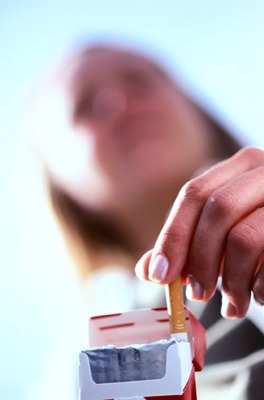Smoking and Breastfeeding Alarming Facts and Statistics
When I was just starting my research on smoking and breastfeeding, it seemed like a pretty easy topic. What I learned about smoking and breastfeeding on top of the general knowledge was a shocking revelation about the effects on kids in general and newborns in particular.

It is worth mentioning that smoking can be of different forms and shapes. Tobacco smoking is the most widely-spread type, it is usually done by means of a cigarette (both pre-made and hand-made), but can also involve cigars, pipes and hookahs. Tobacco may also be chewed and snuffed.
Tobacco contains chemical nicotine. When tobacco burns, nicotine is released and inhaled. So basically any tobacco smoking involves consumption of nicotine.
You’ll find it interesting to know that nicotine was initially discovered to serve as an insecticide – a pesticide used to kill insects. Its role as an insecticide was later discontinued as it turned out too harmful for animals. No wonder, there is a Russian saying: a drop of nicotine can kill a horse.
Smoking is also a method of using recreational drugs, but this is beyond the scope of this article. We’ll limit it to tobacco smoking. But you should know that the following is true for any form of nicotine/tobacco use.
Negative effects of smoking come from three sources:
1. Inhaling nicotine
2. Pesticides and other chemicals used to grow tobacco that you consume. Tobacco is a plant and its leaves are used in cigarette production.
Among other countries, large amount of world tobacco growth is concentrated in Russia, which brings us closer to… Chernobyl, for instance. And if you know even a bit about it – it leaves you wanting nothing to do with smoking that tobacco.
3. By-products of tobacco-burning
Smoking While Pregnant
Most smoking women make decisions to quit the moment they start planning pregnancy. Many others stop smoking when they find out they became pregnant. Either way is best according to the modern research on nicotine and pregnancy.
Smoking during pregnancy is known to cause baby’s low birth weight, to increase the risk of SIDS (Sudden Infant Death Syndrome) and premature birth.
According to the American Academy of Pediatrics, smoking while pregnant also increases baby’s vulnerability to asthma, ear infections and RSV infections (Respiratory Syncytial Virus).
Smoking is also one of the culprits of colic in newborns during the first three months of life.
If you stopped smoking during pregnancy, continue on with your happy breastfeeding! If you haven’t, the following is for you:
Smoking and Breastfeeding
American Academy of Pediatrics deems smoking and breastfeeding incompatible. Breastfed babies get exposed to the risks of smoking either through mother’s milk or second-hand smoke (inhaling when someone near is smoking).
- When smoking and breastfeeding, nicotine and other chemicals from cigarettes are transmitted into breast milk, same as alcohol does. This is known to often cause colic.
- In addition, breastfed babies are in a close proximity to their moms, and involuntarily breathe in the smoke and its by-products. Breastfed babies living in smoke-friendly homes are reported to have frequent respiratory diseases and infections, runny noses, breathing difficulties, irritated eyes, sore throats, and headaches.
- Smoking and breastfeeding negatively affects women too. Cigarette smoking suppresses production of hormone prolactin. Prolactin is responsible for milk production. As a result of lower prolactin level, milk supply drops. Decreased level of prolactin also weakens mom’s attachment to the baby and interest in motherhood.
- Nicotine and other tobacco by-products are also known to affect infants’ nervous system and, same as alcohol, interfere with their sleep pattern. Such babies wake up more often. It may also be caused by reduced milk supply and poor satiety.
- In addition, easier access to lighters and matches at home increases risk of fires and burns.
Even if the baby is bottle-fed, detrimental effects of second-hand tobacco smoking are plentiful. Dr. William Sears presents the following statistics:
- Children exposed to second-hand smoking are more susceptible to pneumonia, asthma, sinus infections, bronchitis, and croup.
- Risk of SIDS is 7 times higher in children exposed to second-hand smoking.
- Children born to smoking parents have twice as many sick visits with respiratory infections and allergies.
- Children exposed to second-hand smoking have higher risk of heart diseases.
- Children living in smoke-friendly households become smokers themselves.
- Children of smoking parents are twice as likely to develop lung cancer in the future.
Action Plan:
If you haven’t given up smoking before or during pregnancy, next best time is before you start breastfeeding. Negative effect of smoking and breastfeeding decreases with every cigarette you don’t smoke. Quitting earlier is best, but quitting later is better than not quitting at all.
- Think about your baby. It is always easier to quit for the benefit of
someone else. Breastfeeding Diet section has more tips about healthy breastfeeding habits.
My father gave up smoking when I told him I was pregnant. He was overseas at the time, and was planning to come visit for the birth of his first grandson. I need to also mention that he had been smoking since 8th grade (it was that popular at the time) and he was 48 when he found out about his future grandson. Talk about deep-rooted habits!
He stopped smoking just like that….easy. There was no “last cigarette and done”, no “I’ll stop on Monday”. The cigarette he smoked before the conversation when I told him I was pregnant was THE LAST. So proud of him!
I guess it takes some maturity to grow into this decision - he didn’t quit
smoking when I was born. But he says if you manage to visualize all the negative
effects smoking has on the baby, quitting becomes easier. But you really trully need to draw all these unpleasant pictures in your mind.
- Breastfeeding is still recommended over formula for smoking mothers.
- Do not allow passive (second-hand) smoking where your baby is.
- If you absolutely have to smoke, do it right after breastfeeding to allow more time for all the chemicals to leave your milk. They won’t all go by the next feeding, but if there is a chance to lower nicotine level in milk, you should do that.
- If you are using nicotine patch or gum, talk to your doctor about how to do it with the minimum effect on breast milk.
- Smoke outside and wash your hands and change clothes before coming in contact with your baby.
- When looking for a babysitter or a day care center, make sure they are smoke-free. A smoking babysitter, who spends 9 hours daily with your child, can do quit some harm.
It is known that nicotine addiction is one of the most difficult to break. Nicotine addiction in women is even harder to stop, which explains high rates of women smoking and breastfeeding. It has, however, been reported doable when done for the sake of someone else. Well, I think your “someone else” is here ready to enjoy this healthy and fun life with you!
There are many ways to show your love and devotion to your kids and to win their trust. Breastfeeding is the most natural one.
Yours,
Viktoriya
Back to top of Smoking and Breastfeeding>Breastfeeding Diet>Breastfeeding Home










